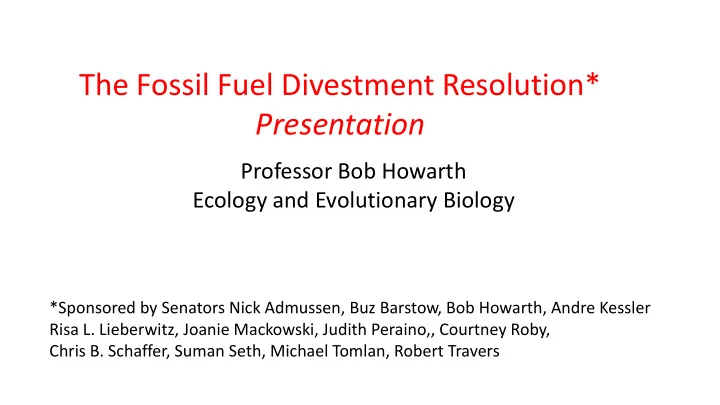

The Fossil Fuel Divestment Resolution* Presentation Professor Bob Howarth Ecology and Evolutionary Biology *Sponsored by Senators Nick Admussen, Buz Barstow, Bob Howarth, Andre Kessler Risa L. Lieberwitz, Joanie Mackowski, Judith Peraino,, Courtney Roby, Chris B. Schaffer, Suman Seth, Michael Tomlan, Robert Travers
The Resolution “Whereas’s” W1 Acceleration of warming trends since the 2015 Paris Accord W2 Unlike other divestment causes, this one is concerns the survival of the planet. W3 Cornell is a leader in sustainability W4 In 2015 the Trustees specified 3 criteria, which if satisfied, would justify divestment. W5 These criteria are satisfied when applied to fossil fuel companies.
The Three Criteria for Divesting of a Company The company’s actions or inactions must be morally reprehensible. The divestment will have meaningful impact in correcting the harm. The harm in question must be so grave as to be inconsistent with the University’s mission
Considering Divestment in a Moment of Climate Emergency
The case for moral reprehensibility: Fossil fuel companies have long known that carbon emissions from their products can lead to massive climate disruption, and they have long engaged and continue to engage in a deliberate campaign of doubt and misinformation..
Archbishop Emeritus Desmond Tutu: (October 3, 2019) “Back in the 1970s and 1980s, one of our most important levers in overcoming apartheid was the support of global corporations that heeded the call to divest. Apartheid became a global enemy; now it is climate change’s turn. “ “Yet energy companies are continuing to explore for new fossil fuel reserves that environmental scientists say we will never be able to use. By the time those reserves are tapped, global temperatures will have risen so high that the world as we know it will have ceased to exist.”
The case for injurious impact: In order to keep the planet from warming to uninhabitable levels, we need to reduce carbon emissions quickly worldwide. Using up current fossil fuel reserves will exceed our carbon budget. But fossil fuel companies, even now, are insisting on expanding exploration and production of oil and gas.
The case for the meaningful impact of divestment: 1. Returns on investments in fossil fuels have been poor for a 2. Businesses work to build and maintain decade, with fossil free portfolios outperforming them every year . strong reputations, and when a great university like Cornell sends the message that fossil fuel companies are disreputable actors, this message can have a meaningful impact on the public view of these companies.
The case for harm so grave that it is inconsistent with the goals and principles of the University. “I t is ethically indefensible that an institution dedicated to the proposition of the renewal of civilization would simultaneously invest in its destruction.”
Partial list of colleges and universities committed to divestment University of California System Trinity College, Dublin Loughborough University Georgetown University University of Copenhagen Manchester Metropolitan University of Massachusetts University of Edinburgh Queensland University Middlebury College University of Gottingen Clare Hall, Cambridge Smith College University of Essex Nottingham Trent Chico State University University of Winchester KU Leuven Rhode Island School of Design University of York Queen’s University Belfast University of Hawaii Cardiff University Queen Mary University Syracuse University National University of Ireland Stockholm University Seattle University Emmanuel College, Cambridge University of Sussex University of Maryland Concordia University University of Bedfordshire Hampshire College La Trobe University University of Ghent Lewis and Clark College Leeds Trinity University University of Glasgow Salem State University London Metropolitan University of Gottingen Oregon State University The New School University of Liverpool
Sustainability is a critical part of the identity of Cornell, the “Greenest” of the Ivies. We still have an opportunity for what economists call “the first mover advantage,” becoming the first of the Ivies to divest from fossil fuels. The time window for this advantage may be closing, as Harvard, Columbia, and others are reconsidering divestment. Let’s be first, and build on our reputation .
Therefore resolved, Be it resolved, that Cornell divest from all investments in coal, oil, and natural gas in an orderly manner and as rapidly as possible.
The resolution is purposefully short, and to the point. Goal is to have all 5 campus governance bodies past the same resolution. Supported by a “white paper” (thanks Prof. Caroline Levine) available at http://theuniversityfaculty.cornell.edu/faculty-senate/archives-and- actions/ongoing-senate-business/resolution-on-fossil-fuel-divestment/
Timeline The goal is for each assembly to pass this resolution before the March 19-20 Trustee meeting: The Faculty Senate (vote on March 11) The University Assembly (vote on Feb 18) The Employee Assembly (vote on Feb 17) The Graduate and Professional Student Assembly (passed unanimously, Feb 10) The Student Assembly (vote on March 12)
Questions What needs to be done between now and the March 11 meeting so that we have a productive, fully informed discussion at that time, prior to a vote? There is list of FAQs in the “white paper,” and another list in the works from the UA special committee on finances and endowment. Are there other issues for us to debate?
Details of Georgetown University approach: • Immediate freeze on companies & funds that focus on fossil fuel exploration or extraction. • Divest from the public securities of fossil fuel companies by 2025. • Divest from private investments by 2030. “The transition from fossil fuels will help the university prevent ‘the most dangerous effects of climate change,’ Michael Barry, the university’s chief investment officer, said in a statement.”
The case for injurious impact Fossil fuel use generates 70% of worldwide carbon dioxide- equivalent emissions. 90 corporations are responsible for 66% of all greenhouse gas emissions. 8 energy companies account for 20 percent of world carbon emissions. These include British Petroleum, Exxon Mobil, Royal Dutch Shell, and Chevron.
Recommend
More recommend